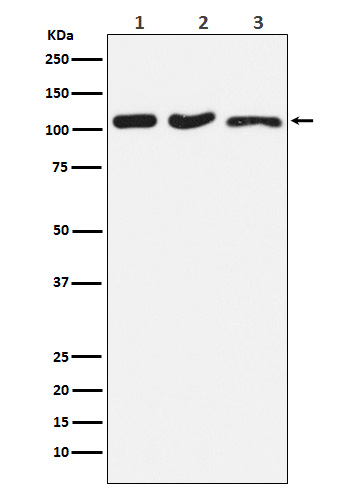
| WB | 咨询技术 | Human,Mouse,Rat |
| IF | 1/20-1/50 | Human,Mouse,Rat |
| IHC | IHC:1/100-1/200;IHF:1/50-1/200 | Human,Mouse,Rat |
| ICC | 1/50-1/200 | Human,Mouse,Rat |
| FCM | 1/20-1/100 | Human,Mouse,Rat |
| Elisa | 咨询技术 | Human,Mouse,Rat |
| Aliases | C1orf136; DISC1; KIAA0457; RP4-730B13.1; SCZD9;;DISC1 |
| WB Predicted band size | Calculated MW: 94 kDa ; Observed MW: 100 kDa |
| Host/Isotype | Rabbit IgG |
| Antibody Type | Primary antibody |
| Storage | Store at 4°C short term. Aliquot and store at -20°C long term. Avoid freeze/thaw cycles. |
| Species Reactivity | Human,Mouse,Rat |
| Immunogen | A synthesized peptide derived from human DISC1 |
| Formulation | Purified antibody in PBS with 0.05% sodium azide,0.05% BSA and 50% glycerol. |
+ +
以下是关于DISC1抗体的3篇代表性文献,简要概括其内容:
---
1. **文献名称**:*Disrupted in Schizophrenia 1 (DISC1): Subcellular targeting and induction of ring mitochondria*
**作者**:Millar, J.K. et al.
**摘要**:该研究首次克隆了人类DISC1基因,并制备了特异性抗体用于检测DISC1蛋白在细胞内的定位。研究发现DISC1定位于线粒体,并参与线粒体形态调控,提示其在神经细胞发育中的潜在作用。
2. **文献名称**:*DISC1 Interacts with the PDE4B Phosphodiesterase to Modulate cAMP Signaling*
**作者**:Sawamura, N. et al.
**摘要**:通过免疫共沉淀和Western blot技术,利用DISC1抗体验证其与磷酸二酯酶PDE4B的相互作用,揭示了DISC1通过调控cAMP信号通路影响神经细胞功能,可能与精神疾病病理相关。
3. **文献名称**:*Species-specific differences in the expression of DISC1 protein in the rodent and primate brain*
**作者**:Koike, H. et al.
**摘要**:研究比较了不同物种(小鼠、大鼠、猴)脑组织中DISC1蛋白的表达差异,通过特异性抗体进行免疫组化和免疫印迹分析,发现灵长类动物DISC1在皮质和海马的表达模式更为复杂。
---
这些文献均涉及DISC1抗体的应用,涵盖蛋白定位、相互作用验证及跨物种表达分析,为研究DISC1在神经精神疾病中的作用提供了技术依据。
The DISC1 (Disrupted in Schizophrenia 1) antibody is a critical tool in neuroscience research, targeting the protein encoded by the DISC1 gene, first identified through its disruption in a Scottish family with a high prevalence of schizophrenia and mood disorders. DISC1 plays a pivotal role in neurodevelopment, regulating processes like neuronal migration, synaptic plasticity, and signaling pathways. Its dysfunction has been linked to psychiatric conditions, including schizophrenia, bipolar disorder, and major depression, as well as neurodevelopmental disorders.
DISC1 antibodies are widely used to study the protein’s expression, localization, and interactions in cellular and animal models. They enable researchers to investigate DISC1’s role in neural circuitry, intracellular transport, and its partnership with molecules like NDEL1 and PDE4B. However, challenges persist due to variability in antibody specificity across studies, leading to conflicting findings. Some antibodies may cross-react with unrelated proteins or fail to detect DISC1 isoforms, complicating data interpretation.
Efforts to validate DISC1 antibodies via knockout controls or mass spectrometry have highlighted the need for rigorous standardization. Despite these issues, DISC1 remains a focal point for understanding the molecular basis of mental illnesses, with antibodies serving as essential tools to explore its pathological mechanisms and potential therapeutic targets. Ongoing research aims to clarify DISC1’s complex biology and reconcile discrepancies in its reported roles.
×